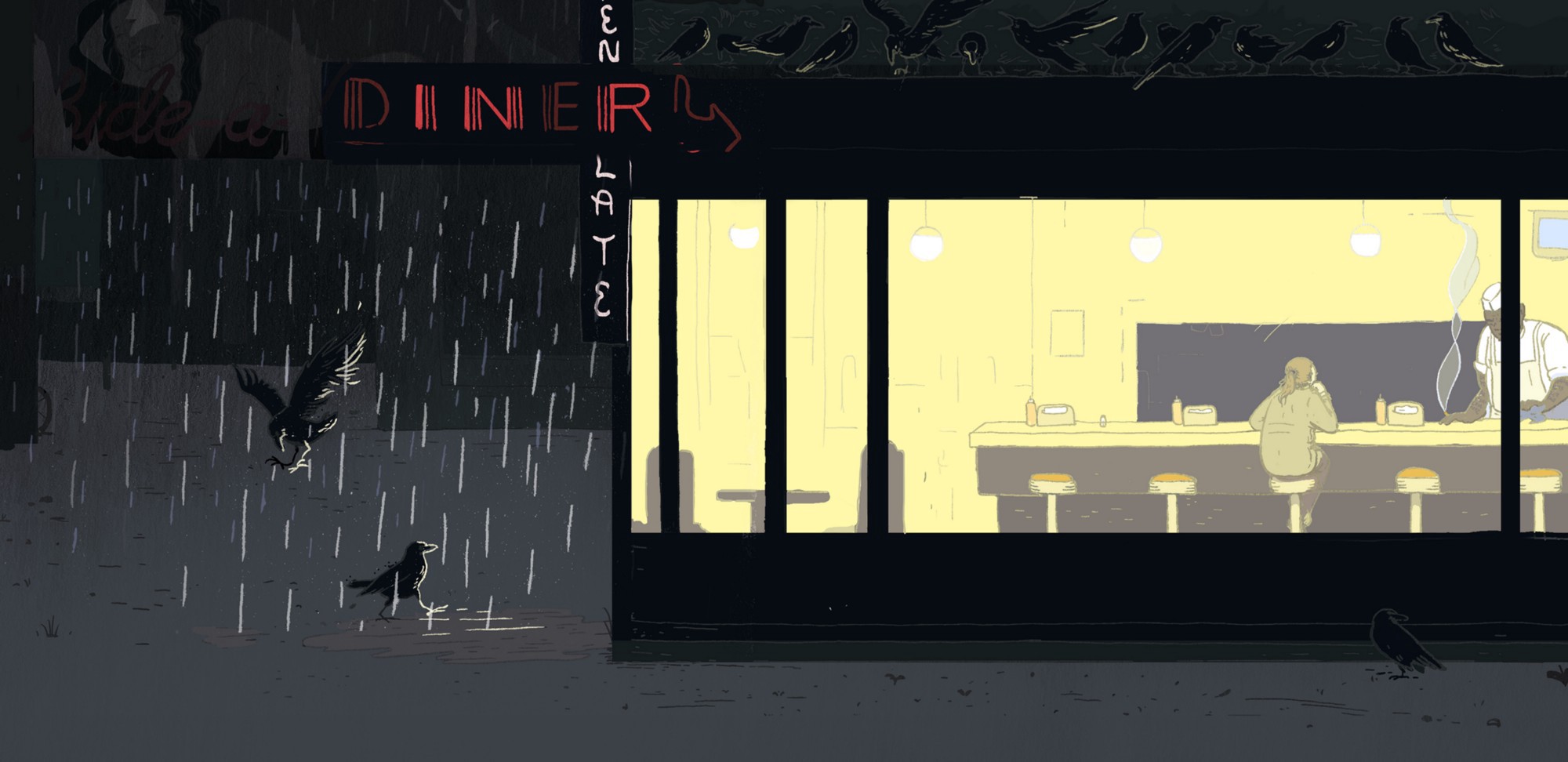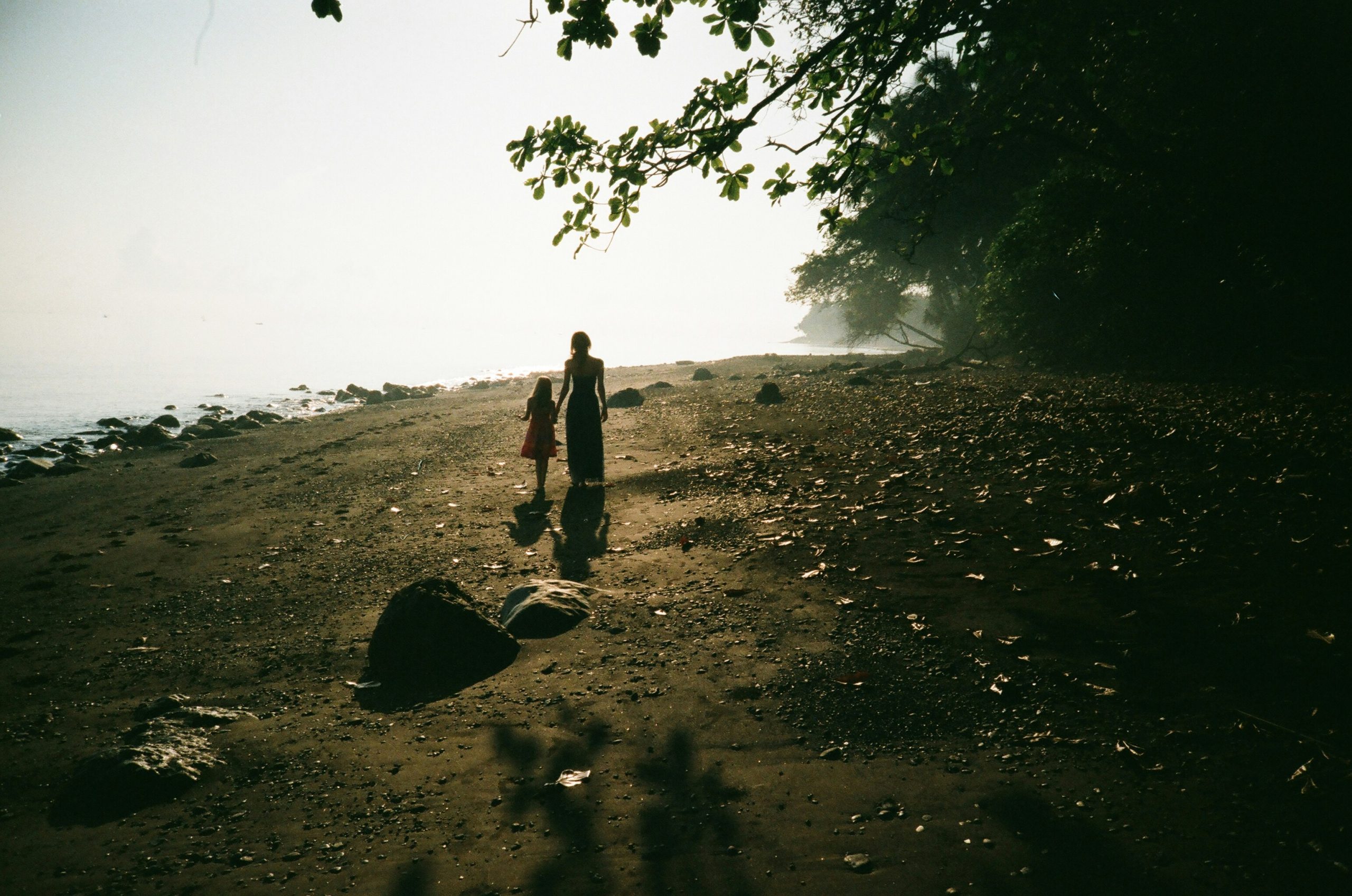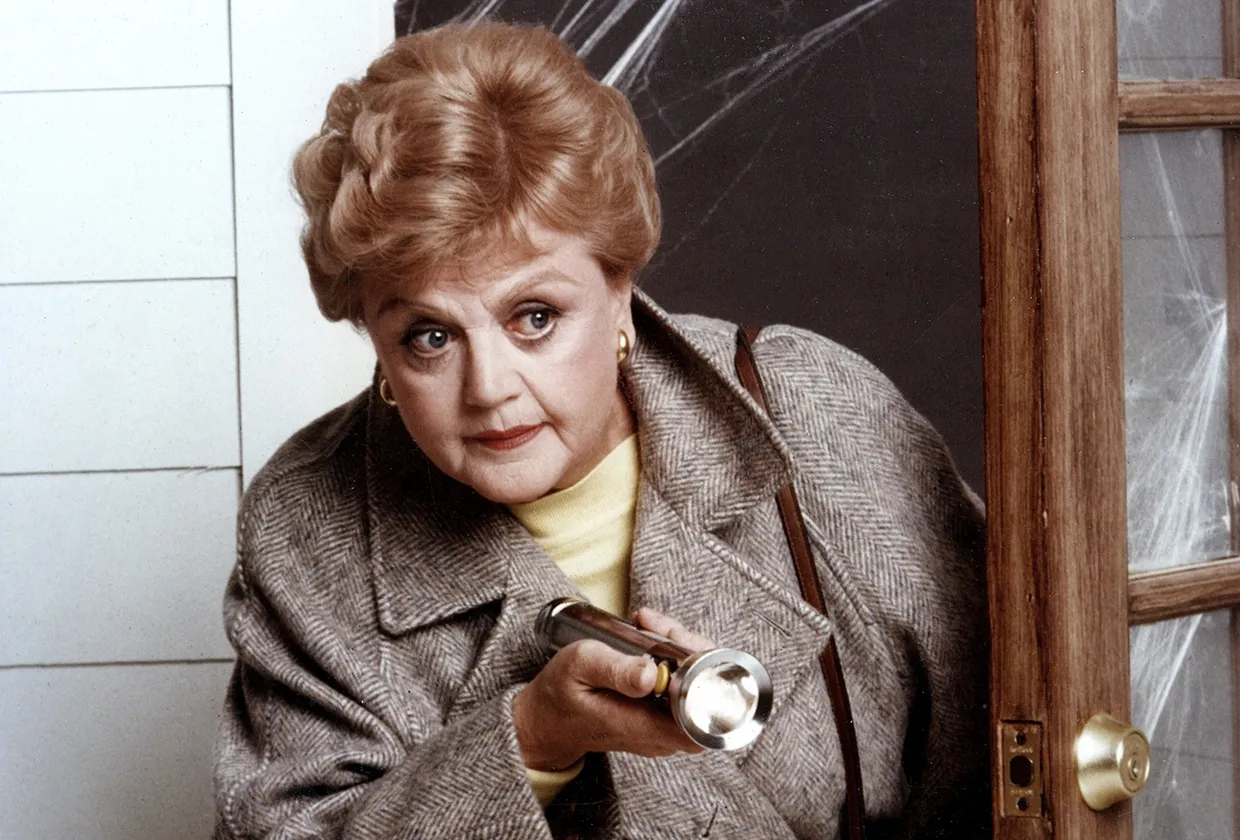Lit Mags
A Very Odd Occurrence of Birds
“Star Witness” by Joe Meno: Episode Four

A Very Odd Occurrence of Birds
Continue reading Episode 5: The Monster at Green Lake
Previous episode: Episode 3: The Secret Song
An ankle. A bare neck. Two wrists lying unprotected on the handlebars. An explosion of wings and warped feathers. Several birds had appeared from nowhere — grackles, she thought at first, though in the dark she couldn’t be sure — 20 or 30 of them scattered across the empty highway. The sound of their voices was metallic, like broken windup toys. Shelley paused to cover her ears, standing her bicycle on the side of the road.
Up ahead, in the center of the one-lane highway, were three small deer, dead — all fawns — plowed down by a lumber truck most probably. The birds had set upon them, picking at their limbs and fur.
She had seen this before, more than once — a doe and both of its fawns lying along the side of the road, looking like they were alive, frozen in midstride. The semis that hauled lumber from the nearby mill seemed unconcerned with the surrounding wildlife that darted back and forth across the road.
When Shelley was 11 or 12 years old, she would put on a show of burying the animals she found, once even going so far as to erect a white-and-pink cross for a slain rabbit she’d discovered, but as soon as her grandmother found out, she swatted Shelley on the behind and told her not to play near the highway.
Shelley now tried to push past, but the birds, with their flapping wings and sharp beaks, were unmovable, pecking indiscriminately at her ankles and feet.
Although she loved animals, and birds especially, she was terrified of them in groups of more than two.
Shelley shouted and began to stomp her feet beside where a formation of birds had gathered upon the smallest fawn. She unzipped her nylon windbreaker and swung it back and forth until the birds reassembled nearby. When they had gone, she leaned over and took the fawn by the rear hoof and quickly dragged it onto the side of the road.
At this time of year, almost all animals were motherless.
Once she had put all three fawns down in the culvert, where the brambles would keep most of the birds away, Shelley went back to where her bicycle was standing, found the blue shoe box containing Mr. Peepers, and quietly placed it beside the ditch.
She stood there, thinking she should say something but not knowing what to say. Shelley remembered her grandmother’s story from earlier that evening and began to speak, having heard it countless times before.
Once upon a time, there was a wily fox who could play the fiddle. And the fox, he would play his song and lure all the birds into the woods, and then he’d gobble them up. And then, one night, the woodsman decided he had to save his birds. He waited and waited in the dark. And then, from out of nowhere, the saddest song you ever heard began to rise from the woods, and the song sounded just like the soft voice of the woodsman’s pretty wife, who had drowned in the well a year before, and the woodsman dropped his axe and could hear the high-pitched laughter of that wily fox. But the woodsman, he never lost heart. He called out to his wife and said, “Agnes, Agnes, if you ever loved me, send down a star to light my way,” and just then, a star came falling from the sky and lit a path home.
Shelley knelt down, touched the box once more, and covered everything with as many branches as she could find, placing a large pyramid of sticks on top of the half-hearted cemetery to keep the forest animals away.
She climbed up from the side of the road and started riding again. Shelley began to think she ought to have done something more—placed a mass card or painted a cross for Mr. Peepers—but only after she had pedaled off.
2.Out of the town, eastward, most of the lights in the houses had gone dark.
Shelley looked down at her watch and saw it was almost 9:30. The sky had begun to mist, and with it, a fog rolled out from the trees. Above, the clouds looked treacherous, uneven.
She could smell the wet aluminum and tin of the junkyard from a quarter-mile away. When she arrived at its looming sheet-metal gates, Shelley saw a strange overhang created by its faded neon sign. She pulled under it and stood her bicycle beside a pile of discarded trash that townspeople left at all odd hours: old refrigerators, parts of a broken oven, car parts. But there were also some toys and dolls, a wagon missing two of its wheels, and a tiny wooden piano. Shelley smiled and knelt down beside the aged instrument. Most of its keys still worked. One side of the piano had been covered with stickers, gold stars.
She tapped at each key with the tip of her finger until she remembered a tune. She began to sing, looking up at the sky.
When the shadows of this life have grown
I’ll fly away
Like a bird from prison bars has flown
I’ll fly away
The gates of the junkyard were locked tight. Not even a 12-year-old would be able to climb over or sneak through, as the top of the fence had been strung up with razor wire. Just to be sure, Shelley gave it a harsh shove. Somewhere at the back of the junkyard, one of the dogs barked.
She called out, “Jamie? Jamie Fay?” And again louder, “Jamie Fay!”
For some reason, Shelley thought of the time when she was six or seven, just before her mother had run off, when she and her grandmother and her mom went down to the Founder’s Day parade and watched the cars and floats pass by. Shelley had sat by the lake with a notebook and her grandmother’s borrowed Polaroid camera, while volunteers once again reenacted the story of the infamous “Monster of the Lake.” She remembered how, even that far back, all she had ever wanted was to see something nobody else had ever gotten to see.
In the dark, Shelley realized what a foolish thing she had been doing, pretending to be someone, something she wasn’t. She knew she would not find the girl, no matter what she had hoped. She sat there in the dark and tried, for her own benefit, not to appear like she was sulking.
A half-hour later, a truck passed by, catching her in its headlight, interrupting her thoughts. She climbed back onto her bicycle and pedaled down the slick road. Up ahead, billboards for the Twilight Motel and Bide-A-While Bar appeared—the billboards themselves suddenly seeming grotesque, the people on them looking like photographs of murder victims, faded, careworn. The signs announcing “See the Hollow Caves” and “Visit the Crystal Waterfalls” were also weathered and faded and depicted families with faces like deformed masks. The girl rode on, the shadows of passing electric poles and buildings making strange, impossible shapes, all becoming crime scenes.
The diner where she worked was just ahead.
She decided to get out of the rain for a while.
3.Inside the diner, Shelley sat across the counter from where the cook was looking up at the black-and-white television set. A news van, with a news reporter, was parked in front of a crowd on Jamie Fay’s street.
The cook was looking up at the television regretfully.
When Shelley sat down, the cook came over to the counter and wiped it down with a greasy-looking red rag. He wore a small paper hat and a white apron. Behind the counter, at this time of night, he was entirely alone.
She realized the cook was the only person she knew in town who was not from there, had not been born there, had arrived entirely on his own. He was dark-complected and had mentioned a mother from the Dominican Republic and a black father in the Marines. Shelley had not thought of it until now, as she was sitting across from the counter, drying off, that he was the only person she had ever laid eyes on in her town who was not exactly like her.
His face looked sad now, almost haggard, as he looked across the counter. “I thought you weren’t supposed to be back up here until tomorrow afternoon.”
She looked up at the clock above the counter and saw it was 9:41 p.m. “Just wanted to be inside, I guess.”
Without having been asked, the cook put a black coffee before her. “You seen the news?” he asked.
She told him she did.
“Do you know that girl? The one from the parade?”
Shelley said so and set down the cup. She observed the tattoos on the cook’s forearms, what her grandmother would knowingly refer to as jailhouse art. One arm, his right, bore a series of faded portraits of old movie stars — Bela Lugosi, Lon Chaney, Boris Karloff, Marilyn Monroe. On his left forearm was a list of names in a gothic font, almost all of them female.
When asked about them several months ago, he said they were his children. Shelley glanced across the counter at the list as the cook lit a cigarette and ashed it in an empty coffee cup.
“Did you ever seen anything like this before?” he asked incredulous, glancing over the black-and-white TV. “One girl goes missing, and the whole town gets turned upside down.”
The cook wiped the clean counter between them as Shelley considered this. “She usually comes in here Friday nights,” he added. “Her and her whole family. Come in and all order dessert.”
Shelley felt herself raise an eyebrow. “But not tonight?” she asked.
“Not tonight. Girl must have wandered off, I guess. I see her after school sometimes. Just walking. Over at the old gas station. In front of the junkyard. Down by the lake. But that don’t mean anything now, does it? Some kids just like to wander.”
“Guess so,” Shelley said.
The cook grinned, taking her empty cup. “First time in a year I haven’t heard you talking up a storm. You sure everything’s all right?”
Shelley shrugged.
“Just thoughtful, huh?” The cook looked over wistfully and asked, “If you could run away somewhere, where would you go?”
“I don’t know,” she said. “I’ve never really thought about it.” Shelley closed her eyes for a few seconds and imagined a room, somewhere not too far away, in Louisville or Indianapolis or Chicago, with a desk and some books on it. Was she going to school in this foreign city, or just working? She felt embarrassed that she could not imagine more. She peered down into her coffee. “What about you? Where would you like to go?”
The cook stared at her and gave a beleaguered grin. “I don’t know. I guess I’d go down to South America. Go somewhere and maybe disappear into the rain forest. Stay there for a while and go explore some other kind of place.”
“That’s my problem,” Shelley said. “Wherever I go, I always end up wanting to be somewhere else.”
“Good for you. That’s how it should be when you’re young.”
For the first time in a while, Shelley thought about the fact that she was as old as her mother was when she had her. Somehow Shelley still felt like a girl. What would it be like to run off? she thought, putting down her coffee cup.
“The thing is, all you need to do is to imagine a place,” the cook said. “The place where you imagine ending up. A place far off from here. Where you can be the person you want to be. Live the kind of life you want to live. Go on. Close your eyes and tell me what you see.”
Shelley closed her eyes. “Okay.”
“What do you see?”
“I don’t know. I can’t see anything.”
“You can’t imagine anything?”
“All I see is an empty room.”
“Ah, so you can see something. Keep looking.”
“Okay. It’s an empty room, far away somewhere. I don’t know, maybe in a city of some kind.”
“It’s the future. You ought to imagine that place and go out and find it.”
She opened her eyes and saw the cook studying her. He stubbed out his cigarette and smiled. “So you’re going back out there?” he asked, seeing that the brief gust of rain had passed.
Shelley put a dollar on the counter and thanked him.
The cook looked at it and smiled and slowly slid it back to her.
Outside, everything looked like summer again. The trees smelled as if they had just gone into bloom, everything becoming soft and translucent. As Shelley rode back toward town, something on a telephone pole caught her eye.
A God’s eye. Then another, on another pole. She stood her bicycle and saw a faint pink-and-red strand of yarn running along the side of the road. A marker, a way to find your way back.
Shelley pedaled furiously, following the strand from pole to pole. Every few feet, it would disappear, and eventually she’d be able to find it again. Every few feet, she saw something had been tied to the string — once a spoon, another time a blurry photograph. On she rode, following the string farther and farther away from town.
Up ahead was a hand-painted billboard for the lake and, beyond that, a low, greenish fog. Before she knew it, the woods beside her had disappeared, and Shelley found she did not recognize anything.
Continue reading Episode 5: The Monster at Green Lake








